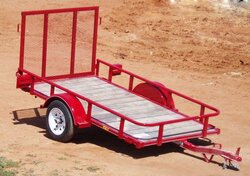Ok, so I finally found a trailer to replace mine with the busted axle.
Its a Big Tex trailer I found of Cl for $400 smackers....not a large one, but big enough for me and my Subaru to tow.
My first project is to check out the bearings and clean/repack...and I found a video so I think I am up for the task.
Question, when I place the bearings back in the hub, and then place the nut on (the one with the cotter pin) - how tight do I want this to be on?
It looks like I would just hand tighten, and then back off a little bit....but it looks to be a judgement call...just hand tighten until there is no play in the wheel? (Don't want to mess things up.
Thanks.
Its a Big Tex trailer I found of Cl for $400 smackers....not a large one, but big enough for me and my Subaru to tow.
My first project is to check out the bearings and clean/repack...and I found a video so I think I am up for the task.
Question, when I place the bearings back in the hub, and then place the nut on (the one with the cotter pin) - how tight do I want this to be on?
It looks like I would just hand tighten, and then back off a little bit....but it looks to be a judgement call...just hand tighten until there is no play in the wheel? (Don't want to mess things up.
Thanks.



